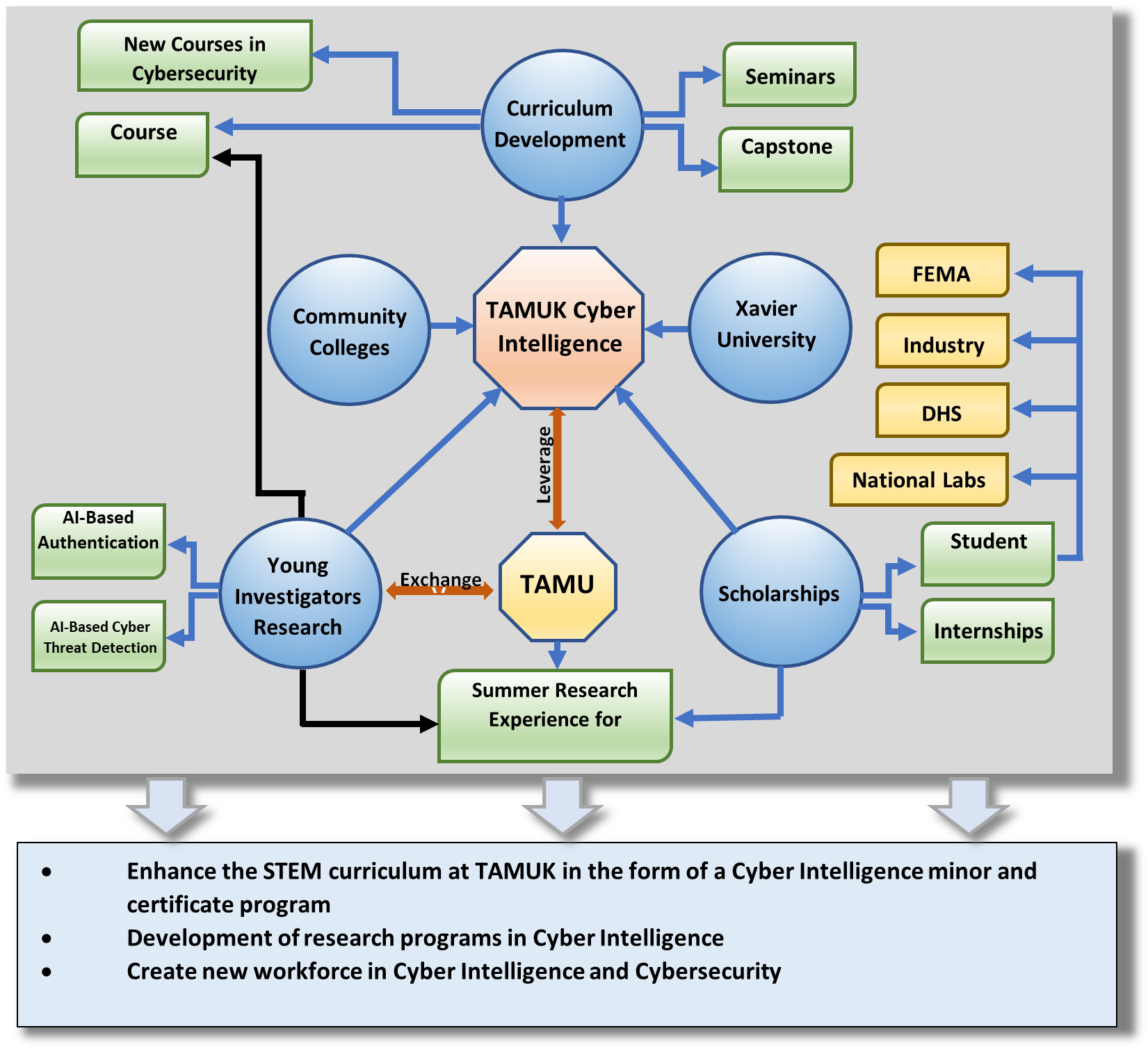Cyber Intelligence Minor Program
Announcement: Please see the following link for information concerning an upcoming special issue of the journal Electronics on the topic of "AI in Cybersecurity", and consider submitting your latest research results. Special issue on AI in Cybersecurity.
Cybersecurity is critical in today’s digital age as it affects the day-to-day life of citizens, governments, and the private sector at all levels. In line with the mission of the Department of Homeland Security (DHS), Texas A&M University-Kingsville (TAMUK), a minority serving institution, is developing a multidisciplinary curriculum and research program in the area of Cyber Intelligence within the College of Engineering to support the preparation of STEM students for careers in areas critical to protecting the nation’s security. This minor program is being strategically designed so that graduates will be able to utilize their knowledge and experience in a variety of areas important to homeland security operations. The program will be open to broad participation from students in all STEM related fields. A central focus of the program will be harnessing the power of artificial intelligence (AI) techniques to counter homeland security cybersecurity challenges and threats. Research activities focused on cyber intelligence areas relevant to DHS will be conducted by project investigators and students to complement the program. A scholarship program for participating students has been established as part of the program. This Program will establish at TAMUK the education, training, awareness, and professional development resources needed to prepare students from the south Texas region and beyond to join the Cyber Intelligence workforce.
Scholarship Application
To apply for a scholarship through this program complete the application form at: Scholarship Application and submit:
- via email to Dr. Mais Nijim at: mais.nijim@tamuk.edu or
- via regular mail to: Dr. Mais Nijim, Electrical Engineering and Computer Science Department, Texas A&M University-Kingsville, MSC 192, 917 W. Ave. B, Kingsville, TX 78363
- in person to the Electrical Engineering and Computer Science Department Office located in room ENGC 206 on the Texas A&M University-Kingsville campus

- Scholarships: Students meeting eligibility criteria can apply for $6,000/academic year scholarships. Scholarship Application Form
- Internships: Students can apply for funded summer internship positions arranged with industry partners.
- Summer research: Students can apply for funded summer research positions arranged with collaborating organizations including Texas A&M University and its associated DHS CBTS Center of Excellence.
- Career path opportunities: students completing the program will be well positioned to pursue job opportunities in the emerging high demand field of cybersecurity.
- Graduate level studies: after completing the program students will be well positioned to continue their studies at the graduate level.
In line with the mission of DHS, the primary goal of this program is to prepare undergraduate students to participate in and meaningfully contribute to the emerging field of Cyber Intelligence. In support of this goal the primary objectives of the program are:
- Establish a multidisciplinary undergraduate minor program focused on Cyber Intelligence that is broadly accessible to all undergraduate students in STEM related disciplines.
- Collaborate with Texas A&M University in College Station and its associated DHS CBTS Center of Excellence to develop and offer undergraduate student research opportunities in Cyber Intelligence related areas.
- Provide participating students with technical knowledge and experience in areas that are central to DHS Cybersecurity related operations.
- Increase representation in the Cybersecurity field of minority students from underrepresented groups.
- Increase awareness of Cybersecurity and Cyber Intelligence throughout the region by conducting outreach activities.
- Collaborate with local community colleges in south Texas to further promote the program to students throughout the region.
- Establish close collaboration with DHS training centers, national labs, and commercial companies involved in DHS related technology areas to establish internship opportunities and to guide the program and ensure graduates have the knowledge and skills necessary to match the demands of the technical workforce.
The activities of the project are anticipated to result in the following significant outcomes:
- Establishment of a new multidisciplinary minor program in Cyber Intelligence that will complement and enhance STEM degree programs at TAMUK.
- An increase in the diversity of students participating in the fields of Cybersecurity and Cyber Intelligence by attracting Hispanic and other underrepresented students to the program.
- Production of a workforce with strong research experiences in Cybersecurity and Cyber Intelligence through collaboration with federal agencies and academic and industry partners.
- An increase in the number of underrepresented and minority graduates available to fulfill DHS Cybersecurity workforce needs.
- An expansion of the accessibility and availability of Cyber Intelligence and Cybersecurity education by sharing the developed curriculum and teaching materials in a publicly accessible format.
- The creation of undergraduate research and hands on training experience opportunities in Cyber Intelligence for students through internships and summer research fellowships at TAMU, national labs, DHS Centers of Excellence, and industrial partners.
- The enhancement of research activities at TAMUK through the establishment of a Cyber Intelligence Lab to promote independent and collaborative research and teaching.
Students participating in the Cyber Intelligence Minor program will be required to complete three core courses along with their choice of three elective courses. All courses are offered within the TAMUK Department of Electrical Engineering and Computer Science.
The required courses for the program are:
- CSEN 2304 Introduction to Computer Science
- CSEN 4370 Introduction to Cybersecurity
- CSEN 4372 Cyber Intelligence
The elective courses for the Cyber Intelligence program are:
- CSEN 4340 Computer Security
- CSEN 4360 Digital Forensics
- CSEN 4367 Artificial Intelligence
- CSEN 4375 Machine Learning
- CSEN 4380 Data Mining
- CSEN 4385 Cloud Computing
